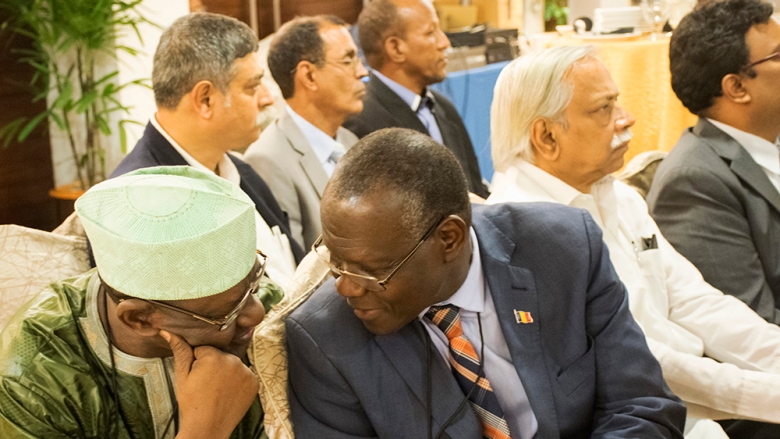In Fulani there is an understanding that when an only child goes to school and comes back home, he has no one to go to for help with his homework. However, if he happens to have five or six siblings, he is guaranteed that somehow, one of them will come to his rescue and explain the assignment. This is what the Malian Minister for Territorial and Population Management, Sambel Bana Diallo told the audience at the opening ceremony of the High-Level Sahel-Bangladesh Knowledge Exchange on Population Policy and Reproductive Health in Dhaka, Bangladesh.
The week-long knowledge exchange, jointly organized by the World Bank Group and the United Nations Population Fund, was hosted by the Ministry of Health and Family Welfare of Bangladesh. The purpose was to exchange practical implementation and policy-related experience between Bangladesh and Sahel countries (Burkina Faso, Chad, Mali, Mauritania, and Niger).
The Sahel countries are facing the multi-sectoral challenges associated with high fertility rates, which Bangladesh faced in the 1970s. The knowledge exchange was part of the World Bank’s Sahel Women’s Empowerment and Demographic Dividend Project. The Sahel countries wanted to learn how Bangladesh was able to sustain support for some 40 years, and implement changes to increase the use of reproductive health services. Bangladesh is particularly interesting for the Sahel because of a similar religious context and a history of the same societal and health services challenges.
“Bangladesh has well-developed practices of pluralism, community engagement and multi-sectoral collaboration, which have helped make its Family Planning program and its Population Policy a success. The country has experienced a dramatic decline in fertility and mortality rates. The government has placed women at the center of the development agenda. It worked with local non-governmental organizations that helped the country achieve success in family planning and address population challenges,” World Bank Country Director Qimiao Fan said during the opening ceremony.
A pluralistic and multi-stakeholder experience
The high-level Sahel delegation of 40 members included a mixed group of participants representing population, religious affairs, health, education, social and women’s affairs, and finance and planning. From the host country’s side, the participants were experienced implementers and policy makers who have had key roles in the changes in Bangladesh in the 1970s, and today.
The five Sahel countries are looking to reduce the high fertility rate, woman and child mortality rate, and child marriage rates, while increasing the education and health protection services available to the population. With limited results available in their population programs, the Sahel countries wanted to change this situation, to benefit from the demographic dividend.
As Niger Minister for Population, Promotion of Women and Child Protection, Rakiatou Christelle Kaffa Jackou said: “We chose Bangladesh because, like Niger, it was once an underdeveloped country and the majority of the population is Muslim. We really wish to deepen our knowledge and understand how the local women here obtained their independence and how they gained empowerment. So we are eager to find out how the population policy succeeded here and how we could try to adopt it in Niger and make it succeed.”
Emerging lessons
The delegation had a long wish list of questions for the Bangladeshi team:
- how it has engaged a range of stakeholders from different sectors in a population policy that has had financing and lasting support;
- how it has convened support of religious leaders for its reproductive health activities;
- how it has engaged citizens and local communities, even in remote areas to improve reproductive health services;
- understanding innovative strategies that have worked in the country to empower women to make reproductive health decisions; and,
- how multiple parties have worked together with the population, religious leaders and the government to change Bangladesh's demographic scenario
The delegation met with key policy makers who presented a thorough and detailed explanation about the population policy that helped Bangladesh reduce the total fertility rate from 6.3 to 2.3 births per woman and increasing the rate of prevalence of contraceptive users from 7 to 62.4 percent (1970-2014).
The delegation visited numerous centers around the city to understand family planning and community practices in Bangladesh that have been used to catalyze change. More importantly, the visits deepened their knowledge and understanding of innovative strategies to allow the delegates to use them first-hand when they returned to the countries.
On one such visit to a local community clinic outside Dhaka, they were introduced to the sound of a siren being used in a small village to help increase its contraceptive prevalence rate. The community leaders said it would sound each night at exactly 9:00 pm to remind women to take their pill. The sound was loud enough to be heard at a distance of two kilometers.
On another visit to the Imam Training Academy of the Ministry of Religious Affairs in Dhaka, they were introduced to the rigorous training program for Imams. Imams being direct spiritual guides for the population, their training covers a range of societal issues
Next steps
Since returning from the knowledge exchange, the Sahel countries have already presented these lessons to their governments, along with action plans to continue working with Bangladesh.
Some of these include: collaborating with counterparts in Bangladesh to develop a program for Imams on reproductive health, developing a strategy to improve family planning services in communities by adapting lessons from Bangladesh to the Sahel context. The next steps will be integrated to support the World Bank’s Sahel Women’s Empowerment and Demographic Dividend Project, as well as World Bank country operations in Niger and Mali.

